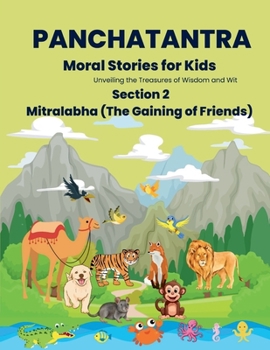Panchatantra Mitralabha: Moral Stories for Kids
The Panchatantra: Unveiling the Treasures of Wisdom and Wit The Panchatantra, an ancient collection of animal fables and moral stories, stands as a timeless masterpiece of wisdom and storytelling. Its name translates to "Five Principles," referring to its five sections, or "tantras," each containing a plethora of engaging tales that impart profound life lessons. Believed to have been written in India more than two millennia ago, the exact origins of the Panchatantra remain shrouded in the mists of time. The renowned sage Vishnu Sharma is often attributed as the compiler and author of this literary treasure. Composed in Sanskrit, the Panchatantra has since been translated into numerous languages, becoming a global literary phenomenon. The primary purpose of the Panchatantra is to educate and entertain, using the interactions of animal characters to convey ethical and practical principles. These anthropomorphic tales delve into complex human emotions, foibles, and virtues, allowing readers to glean invaluable insights into human nature and behavior. Structured as a frame narrative, the Panchatantra unfolds within the context of a teacher imparting these tales to instruct young princes in the art of governance and diplomacy. The stories are framed within larger narratives, adding layers of depth and context to the overarching lessons. The Panchatantra is divided into five distinct sections, each with its own thematic focus: 1. "Mitrabheda" (The Loss of Friends): Explores the dynamics of friendships, trust, and betrayal, encouraging readers to carefully navigate the complexities of human relationships. 2. Mitralabha (The Gaining of Friends): Emphasizes the art of forming alliances and building rapport, highlighting the significance of communication and diplomacy. 3. Kakolukiyam (Of Crows and Owls): Depicts the perils of haste and the importance of discernment, cautioning against blind trust and impulsive actions. 4. Labdhapranasam (Loss of Gains): Delves into the prudent management of wealth, the consequences of greed, and the impermanence of material possessions. 5. Apariksitakarakam (Ill-Considered Actions): Sheds light on the repercussions of impulsive decisions and the significance of forethought and introspection. The Panchatantra's enduring appeal lies in its ability to transcend time and culture, resonating with readers of all ages and backgrounds. Its narratives are interwoven with wit, humor, and clever wordplay, making it an engaging read while imparting profound life lessons. The tales' universal themes touch upon the intricacies of human existence, fostering empathy and encouraging reflection. The Panchatantra stands as a literary marvel that continues to captivate and enlighten generations across the globe. With its tales of cunning foxes, wise jackals, loyal friends, and treacherous foes, the Panchatantra offers a captivating glimpse into the human experience, leaving an indelible mark on the world of literature and philosophy.
Format:Paperback
Language:English
ISBN:B0CH28R45P
ISBN13:9798859766871
Release Date:August 2023
Publisher:Independently Published
Length:30 Pages
Weight:0.27 lbs.
Dimensions:0.1" x 8.5" x 11.0"
Customer Reviews
0 rating





